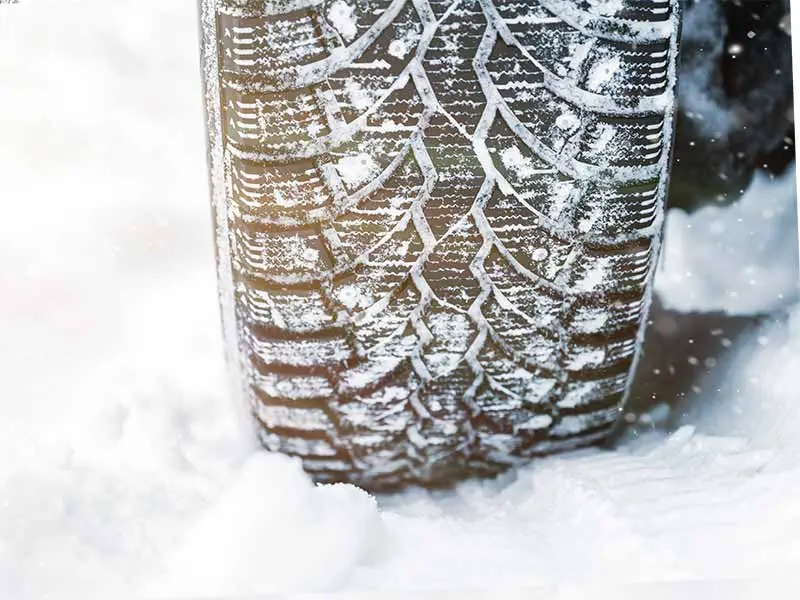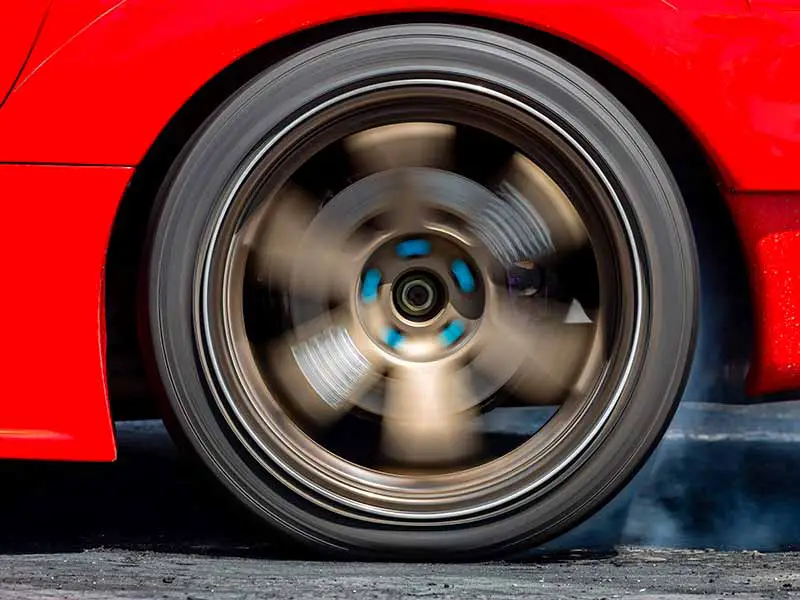Ever felt that heart-pounding rush when your car skids just a tad on a chilly morning? Tires aren’t just round rubbery things – they’re the unsung heroes of every ride, and knowing which ones to use can be the difference between a smooth drive and a slippery mishap.
Summer Tires Temperature Range
Summer tires are designed for warmer temperatures and can become less effective and even risky as temperatures drop below 45°F (7°C). In cold weather, they may harden, lose grip, and not perform as intended.
In this article, we’ll delve deep into the intricacies of summer tires, discover the science behind their performance, answer your most pressing questions, and guide you in making the safest tire choice for every season.
Let’s take a closer look.

The Science Behind Summer Tires
Tires may seem like just round, rubbery things that keep your car off the ground, but there’s a lot of sophisticated science-y stuff going on there. And when it comes to summer tires, it’s all about soaking up those sun rays and keeping things rolling smoothly.
Designed for Warm Temperatures
Every tire is crafted with a special job in mind, and summer tires? Well, they’re the beach bums of the tire world!
The Perfect Extreme Heat
- Grip and Road Love:
- Summer tires are designed with a special rubber that grips the road super well in warm temperatures.
- It’s like how we get a bit sweaty in the heat. That little bit of stickiness? Summer tires have that with the road, but in a good way.
- Handling the Rain:
- But what about those summer showers? No worries! Summer tires have grooves crafted to handle wet roads.
- Think of it like the tread on your sneakers, helping you not to slip when you step on a puddle.
Summer Tires in Below Freezing Temperatures
Here’s where things get a tad tricky. Ever tried wearing flip-flops in the snow? That’s how summer tires feel in cold weather.
- The Rubber Problem:
- That same rubber that’s all soft and grippy in the heat? It gets hard and less flexible when it’s cold.
- It’s kinda like how a gummy bear left in a freezer becomes hard.
- Less Grip, More Slip:
- Because they harden in the cold, summer tires can’t grip the road as well in freezing temperatures.
- That means they might not stop as quickly, or might slide around a bit, especially if there’s frost or a sneaky ice patch.

Common Concerns and Questions about Summer Tires in Cold Weather
There are many common questions about using summer tires when the temperature starts to drop. Let’s tackle some of these head-on!
What Temperature is Too Cold for Summer Tires?
Every tire has its comfort zone. For summer tires, it’s, well, summer temperatures!
The Winter Driving Threshold
- When Summer Tires Start to Complain:
- Generally, when temperatures consistently drop below 45°F (7°C), summer tires start to lose their mojo.
- Remember the gummy bear analogy? That’s the point when it starts feeling more like it’s fresh out of the freezer.
Will Summer Tires Crack in Winter?
No one wants their tires falling apart, right? So let’s dig into this one.
Keeping Things Intact
- Cold Temps and Rubber:
- Extreme cold can make the rubber in summer tires brittle.
- But here’s the deal: They won’t spontaneously crack like an egg. However, if they’re old or worn out, cold can speed up the aging process.

Can You Drive with Summer Tires in the Cold?
This is a biggie! Short answer? It’s doable, but…
Weighing the Risks
- Less Grip:
- As temperatures drop, the tires won’t grip the road as well.
- This can mean longer stopping distances and a higher risk of sliding around.
- Not the Best, But Not Impossible:
- It’s like using a butter knife instead of a steak knife. You can, but it’s not the best tool for the job.
How Dangerous Are Summer Tires in Winter?
Safety first, always! So let’s see where summer tires stand in winter conditions.
Frosty Adventures
- Lack of Traction:
- Especially on snowy or icy roads, summer tires can struggle big time.
- Think of it like trying to run on an ice rink in sneakers. Slip and slide!
- Beware of the Sneaky Black Ice:
- This is a thin layer of ice on the road, and it’s hard to spot. With summer tires, you’re more likely to skid on this ninja ice.
Can You Store Summer Tires in an Unheated Garage?
Summer vacation for your tires? Let’s chat about that.
The Big Chill
- Safe and Sound:
- You can definitely store summer tires in an unheated garage, but it’s essential they’re kept away from direct sunlight and major temperature swings.
- Just like you’d store a cake away from ants and nosy pets, tires need their cozy spot too!

Making the Right Choice for Your Safety
Hey, let’s get real for a moment. While tires are super cool (I mean, I could talk about them all day), at the end of the day, it’s all about staying safe. So, how can you make sure you’re riding on the right rubber for the road?
When to Switch to Winter or All-Season Tires
Switching between summer vibes and winter wonderland? Your tires should, too!
The Seasonal Swap
- Checking the Forecast:
- If you’re consistently seeing temperatures below 45°F (7°C), it’s time to think about a tire switch.
- Watch Out for the First Frost:
- Even before the snow piles up, the first frost can make roads slippery. That’s when summer tires start wishing they could hibernate.
- Where You Live Matters:
- If your hometown looks like a snow globe for half the year, investing in winter tires is a no-brainer. But if snow’s a rare guest, all-season tires might be your best bud.
Recognizing Signs of Tire Wear
All good things come to an end, and tires, well, they’re no exception.
Time for a Tire Checkup!
- Tread Depth Matters:
- The deeper the treads, the better the grip. Once they’re worn down, the grip goes bye-bye.
- Here’s a fun trick: Grab a penny! If Lincoln’s head is fully visible when you stick it in the tread, it’s time for a change.
- Look for Cracks and Bubbles:
- These are like the wrinkles of the tire world. Too many, and it’s a sign your tire’s getting old and might need replacing.
- Feeling the Vibe:
- If your ride feels bumpier than usual or you’re getting some weird vibrations, it might be your tires telling you they’re tired. Time for a check!

Understanding Tires and Their Specializations
Here’s a breakdown of the main players in the tire game:
- Summer Tires:
- Best for hot asphalt and those sunny road trips.
- Imagine them like your favorite pair of sneakers: perfect for a sunny day, but not so much for a snowy one.
- Winter Tires (Dedicated Winter Tires):
- Your car’s snow boots! Made especially for icy roads and snowball fights (well, maybe not the snowball part).
- They grip like a pro on slippery surfaces.
- All Season Tires:
- The jack-of-all-trades. Good for both sun and snow, but they might not be the absolute best for either.
- Think of them like your everyday work shoes. They’ll do the job, but sometimes you just need those fancy dancing shoes or rugged hiking boots.
What Makes Each Tire Type Unique
Now that we’ve got the basics down, let’s look at the details that set each tire apart.
Rubber Compound Differences
- Summer Tires:
- Made of a softer rubber that sticks to the road like glue during warm temperatures.
- But… it gets a bit stiff in cold weather.
- Winter Tires:
- These guys are made of a softer rubber that doesn’t get hard in cold temperatures. They stay flexible and grippy even when it’s freezing.
- All Season Tires:
- They’re the middle ground. The rubber is kind of a mix between summer and winter tires. So, it won’t be as soft as a summer tire in hot weather, or as flexible as a winter tire in the cold.
Tread Depth and Design
- Summer Tires:
- Have shallower treads. They’re made to handle rain but aren’t the best buddies with snow or mud.
- Winter Tires:
- These have deep treads with lots of grooves. This design helps them push away snow and slush. It’s like having built-in snow shovels!
- All Season Tires:
- They’ve got a mix of treads. Not too shallow, not too deep, just right for a bit of everything.
Resources
Below are some links you may find helpful when learning about tires
- Summer tires vs. winter tires – Continental Tire
- Can I drive summer performance tires in cold temperatures? – Tire Rack
Final Thoughts
Navigating the world of tires can feel like a twisty road, but with the right knowledge, you’re set for a smooth drive!
Summer tires, with their specialized design, are fantastic for warm temperatures but can lose their effectiveness as the thermometer drops below 45°F (7°C). They can harden, making them less grippy and potentially risky.
As the seasons shift and cold weather starts creeping in, it’s essential to consider switching to more suitable tire types, like winter or all-season tires. Remember, your tires aren’t just about performance; they’re the guardians of your safety on the road.
Good luck and happy motoring.





